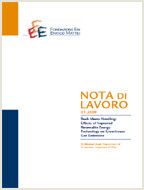Tragedy of the Commons and Evolutionary Games in Social Networks: The Economics of Social Punishment

18.06.2017
Jorge Marco (University of Girona); Renan Goetz (University of Girona)
C71, D85, Q25
Tragedy of the Commons, Cooperation, Evolutionary Game, Social Network, Social Punishment
Economic Theory and Applications
Carlo Carraro
This study revisits the problem of the tragedy of the commons. Extracting agents participate in an evolutionary game in a complex social network and are subject to social pressure if they do not comply with the social norms. Social pressure depends on the dynamics of the resource, the network and the population of compliers. We analyze the influence the network structure has on the agents’ behavior and determine the economic value of the intangible good – social pressure. For a socially optimal management of the resource, an initially high share of compliers is necessary but is not sufficient. The analysis shows the extent to which the remaining level of the resource, the share of compliers and the size, density and local cohesiveness of the network contribute to overcoming the tragedy of the commons. The study suggests that the origin of the problem – shortsighted behavior – is also the starting point for a solution in the form of a one-time payment. A numerical analysis of a social network comprising 7500 agents and a realistic topological structure is performed using empirical data from the western La Mancha aquifer in Spain.
***
